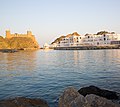| Al Alam Palace | |
|---|---|
قصر العلم | |
 | |
|
| |
| General information | |
| Type | Palace |
| Address | JH8V 9V8 |
| Town or city | Old Muscat |
| Country | Oman |
| Coordinates | 23°36′58″N 58°35′41″E / 23.6160°N 58.5947°E |
| Owner | Sultan of Oman |
The Al Alam Palace ( Arabic: قصر العلم Qaṣr al-ʿAlam, "Palace of the Flag") is the ceremonial palace of the Sultan of Oman. It is used for official functions like welcoming foreign dignitaries and heads of state.
Old Palace
Sultan Said bin Sultan had a palace, Bayt al-'Alam, built in the early 1800s on the foundations of the old sea wall between Al Mirani Fort and Al Jalali Fort built in the 16th century by the Portuguese. The palace was damaged by tribal insurgents in 1895 but Sultan Faisal bin Turki did not have it repaired due to lack of funds. In the 20th century, Sultan Said bin Taimur spent most of his time in Salalah and had the palace locked up. It was demolished in 1971 to make way for the new palace. [1]
Current Palace
Sultan Qaboos bin Said had a new palace, Qaṣr al-ʿAlam, built in the same location between the two forts in 1972. [2] It has a unique façade of gold and blue columns. The inner grounds of the palace remain off-limits, but members of the public are permitted to stop near the gates and take photographs. [3]
Surrounding Area
Al Alam Palace is surrounded by the Portuguese-built Mirani and Jalali forts. [4] Government buildings in the vicinity are white, with crenellated rooftops and wooden balconies in the traditional Omani style. [5] The palace can also be viewed by boat from the harbour. [6]
Gallery
-
main entrance
-
courtyard
-
sideview
-
gate
-
view from the harbor
-
corridor
See also
References
- ^ Peterson, John (2006). Historical Muscat. Brill. ISBN 978-9-0041-5266-3.
- ^ Kay, Shirley (1988). Enchanting Oman. Motivate Pub. ISBN 978-1-8606-3085-9.
- ^ Walker, Jenny; Ham, Anthony (1 August 2016). Lonely Planet Oman, UAE & Arabian Peninsula. Lonely Planet. p. 313. ISBN 978-1-78657-305-6.
- ^ Ochs, Peter J. (1 November 1999). Maverick Guide to Oman. Pelican Publishing. p. 212. ISBN 978-1-56554-687-5.
- ^ Thomas, Gavin (17 October 2013). The Rough Guide to Oman. Rough Guides Limited. p. 75. ISBN 978-1-4093-5065-1.
- ^ Darke, Diana (14 November 2013). Oman. Bradt Travel Guides. p. 100. ISBN 978-1-84162-471-6.
| Al Alam Palace | |
|---|---|
قصر العلم | |
 | |
|
| |
| General information | |
| Type | Palace |
| Address | JH8V 9V8 |
| Town or city | Old Muscat |
| Country | Oman |
| Coordinates | 23°36′58″N 58°35′41″E / 23.6160°N 58.5947°E |
| Owner | Sultan of Oman |
The Al Alam Palace ( Arabic: قصر العلم Qaṣr al-ʿAlam, "Palace of the Flag") is the ceremonial palace of the Sultan of Oman. It is used for official functions like welcoming foreign dignitaries and heads of state.
Old Palace
Sultan Said bin Sultan had a palace, Bayt al-'Alam, built in the early 1800s on the foundations of the old sea wall between Al Mirani Fort and Al Jalali Fort built in the 16th century by the Portuguese. The palace was damaged by tribal insurgents in 1895 but Sultan Faisal bin Turki did not have it repaired due to lack of funds. In the 20th century, Sultan Said bin Taimur spent most of his time in Salalah and had the palace locked up. It was demolished in 1971 to make way for the new palace. [1]
Current Palace
Sultan Qaboos bin Said had a new palace, Qaṣr al-ʿAlam, built in the same location between the two forts in 1972. [2] It has a unique façade of gold and blue columns. The inner grounds of the palace remain off-limits, but members of the public are permitted to stop near the gates and take photographs. [3]
Surrounding Area
Al Alam Palace is surrounded by the Portuguese-built Mirani and Jalali forts. [4] Government buildings in the vicinity are white, with crenellated rooftops and wooden balconies in the traditional Omani style. [5] The palace can also be viewed by boat from the harbour. [6]
Gallery
-
main entrance
-
courtyard
-
sideview
-
gate
-
view from the harbor
-
corridor
See also
References
- ^ Peterson, John (2006). Historical Muscat. Brill. ISBN 978-9-0041-5266-3.
- ^ Kay, Shirley (1988). Enchanting Oman. Motivate Pub. ISBN 978-1-8606-3085-9.
- ^ Walker, Jenny; Ham, Anthony (1 August 2016). Lonely Planet Oman, UAE & Arabian Peninsula. Lonely Planet. p. 313. ISBN 978-1-78657-305-6.
- ^ Ochs, Peter J. (1 November 1999). Maverick Guide to Oman. Pelican Publishing. p. 212. ISBN 978-1-56554-687-5.
- ^ Thomas, Gavin (17 October 2013). The Rough Guide to Oman. Rough Guides Limited. p. 75. ISBN 978-1-4093-5065-1.
- ^ Darke, Diana (14 November 2013). Oman. Bradt Travel Guides. p. 100. ISBN 978-1-84162-471-6.





